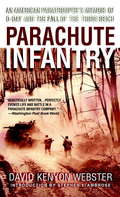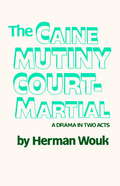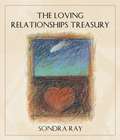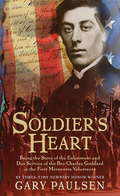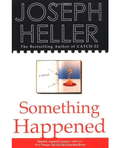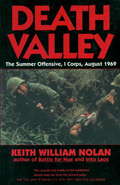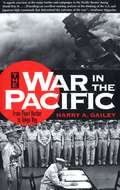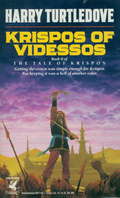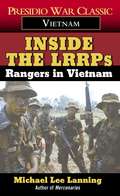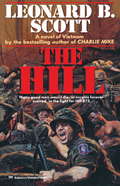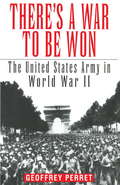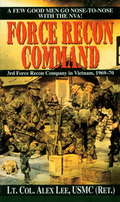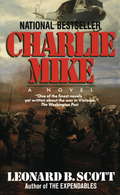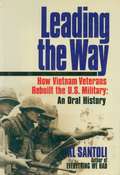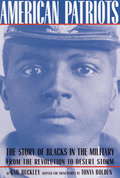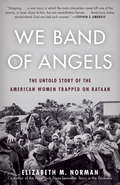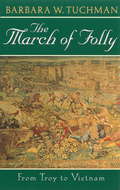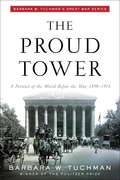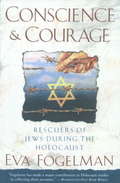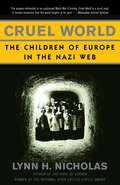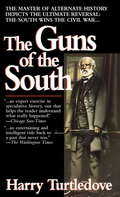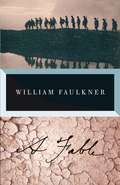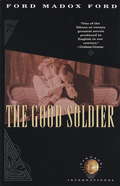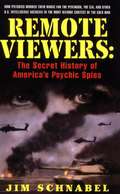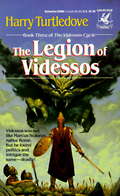- Table View
- List View
Parachute Infantry: An American Paratrooper's Memoir of D-Day and the Fall of the Third Reich
by David Webster<p>David Kenyon Webster's memoir is a clear-eyed, emotionally charged chronicle of youth, camaraderie, and the chaos of war. Relying on his own letters home and recollections he penned just after his discharge, Webster gives a first hand account of life in E Company, 101st Airborne Division, crafting a memoir that resonates with the immediacy of a gripping novel. <p>From the beaches of Normandy to the blood-dimmed battlefields of Holland, here are acts of courage and cowardice, moments of irritating boredom punctuated by moments of sheer terror, and pitched urban warfare. Offering a remarkable snapshot of what it was like to enter Germany in the last days of World War II, Webster presents a vivid, varied cast of young paratroopers from all walks of life, and unforgettable glimpses of enemy soldiers and hapless civilians caught up in the melee. <p><i>Parachute Infantry</i> is at once harsh and moving, boisterous and tragic, and stands today as an unsurpassed chronicle of war--how men fight it, survive it, and remember it. NOTE: This edition does not include photos.</p>
The Caine Mutiny Court-Martial
by Herman WoukHerman Wouk's boldly dramatic, brilliantly entertaining novel of life—and mutiny—on a Navy warship in the Pacific theater was immediately embraced, upon its original publication in 1951, as one of the first serious works of American fiction to grapple with the moral complexities and the human consequences of World War II. In the intervening half century, The Caine Mutiny has become a perennial favorite of readers young and old, has sold millions of copies throughout the world, and has achieved the status of a modern classic.
The Loving Relationships Treasury
by Sondra RayCollected from her groundbreaking series of relationship books, THE LOVING RELATIONSHIPS TREASURY distills the core teachings of Sondra Ray's unique approach to finding, achieving, and maintaining the deepest, most fulfilling relationships possible. Ray's timeless writing continues to inspire us to begin our personal journeys toward integrating intimacy and spirituality within every significant relationship-with ourselves, our mates, our parents, our children, our colleagues, our world.From the Trade Paperback edition.
Soldier's Heart: Being the Story of the Enlistment and Due Service of the Boy Charley Goddard in the First Minnesota Volunteers
by Gary PaulsenGary Paulsen introduces readers to Charley Goddard in his latest novel, Soldier's Heart. Charley goes to war a boy, and returns a changed man, crippled by what he has seen. In this captivating tale Paulsen vividly shows readers the turmoil of war through one boy's eyes and one boy's heart, and gives a voice to all the anonymous young men who fought in the Civil War.From the Hardcover edition.
SOMETHING HAPPENED
by Joseph HellerBob Slocum was living the American dream. He had a beautiful wife, three lovely children, a nice house...and all the mistresses he desired. He had it all -- all, that is, but happiness. Slocum was discontent. Inevitably, inexorably, his discontent deteriorated into desolation until...something happened.Something Happened is Joseph Heller's wonderfully inventive and controversial second novel satirizing business life and American culture. The story is told as if the reader was overhearing the patter of Bob Slocum's brain -- recording what is going on at the office, as well as his fantasies and memories that complete the story of his life. The result is a novel as original and memorable as his Catch-22.
Death Valley: The Summer Offensive, I Corps, August 1969
by Keith NolanAuthor of the well received Battle for Hue and Into Laos, Nolan once again captures the stark reality of combat in Vietnam.
War in the Pacific: From Pearl Harbor to Tokyo Bay
by Harry GaileyGailey (history, San Jose State U. ) details the performance of Japanese and Allied naval, air, and land forces in every major military operation in the Pacific theater in WWII. He examines the events leading up to the war; compares the Japanese and American economies and societies, war plans, and equipment; and chronicles actions from the early Allied defeats in the Philippines to the final agonies of the Japanese people. Contains b&w photos and maps. Annotation c. by Book News, Inc. , Portland, Or.
Krispos of Videssos
by Harry TurtledoveAgainst all expectations, Krispos had won the crown of Videssos. But how long could he hope to keep head and crown together?For trouble was brewing in every, quarter. Civil war erupted under Petronas, the late Emperor's uncle. A brilliant general and a canny politician, Petronas had a very personal score to settle against the upstart Krispos.And even as rebel troops took the field against the untried Emperor, outland raiders swept down from the northlands in a tide of carnage. The power stemmed from foulest sorcery, and Videssos' wizards could not counter its evil curse.Krispos reign showed every sign of being brief -- and very bloody...From the Paperback edition.
Inside the LRRPs: Rangers in Vietnam
by Michael Lee LanningVietnam was a different kind of war, calling for a different kind of soldier. The LRRPs--Long Range Reconnaissance Patrols--were that new breed of fighting man. They operated in six-man teams deep within enemy territory, and were the eyes and ears of the units they served. This is their story--of perseverance under extreme hardship and uncommon bravery--and how they carried out the war's most hazardous missions.
The Hill
by Leonard B. ScottTy is the grunt. Point man for his platoon. Jason is the favored one: a football hero picked for officer training school who leads his men into a slaughter ground from which most of them will never return. Ty and Jason -- Oklahoma brothers different in character, yet close in soul -- are about to meet in the Battle of Dak To, upon the blood-drenched sides of Hill 875.
There's a War to Be Won: The United States Army in World War II
by Geoffrey PerretTHERE'S A WAR TO BE WON is the landmark story of one of the greatest armies in history, a conscript force of amateur soldiers who had an unparalleled record of combat success. Here -- for the first time in one volume -- is the chronicle of the United States Army's dramatic mobilization and stunning march to victory in World War II.In a lively and engrossing narrative that spans theaters of operations around the world, Geoffrey Perret tells how the Army was drafted, trained, organized, armed, and led at every stage of the war. Beginning with the prescient military planners of the 1930s, he offers vivid warts-and-all profiles of the farsighted commanders who would lead the way, men like Marshall, MacArthur, Eisenhower, Ridgway, Bradley, and Patton.Drawing heavily on important new source material in major archives throughout the United States, THERE'S A WAR TO BE WON offers new insights into the wartime Army, its commanders, and its battles. A major work of American military history."An immensely readable, well-researched history . . . Dramatic." -- Chicago TribuneFrom the Paperback edition.
Force Recon Command
by Alex LeeTHE A SHAU VALLEYWHERE THE NVA WAS KING . . . In order to prevent surprise attacks on U.S. forces as they were pulling out of Vietnam, someone had to be able to pinpoint the NVA's movements. That dangerous job was the assignment of then-major Alex Lee and the Marines of the 3rd Force Reconnaissance Company when he assumed command in late 1969. They became the tip of the spear for Lt. Gen. Herman Nickerson's III MAF. And each time one of Lee's small, well-motivated, well-led, and wildly outnumbered teams was airlifted into the field, the men never knew if the day would end violently.But whether tracking NVA movements, recovering downed air crews, or making bomb-damage assessments after B-52 strikes, Major Lee's Few Good Men never forgot who they were: Each of them was in Vietnam to live like a Marine, win like a Marine, and, if need be, die like a Marine.Forthright and unabashed, Lieutenant Colonel Lee leaves no controversy untouched and no awe-inspiring tale untold in this gripping account of 3rd Force Recon's self-sacrifice and heroic achievement in the face of overwhelming odds.From the Paperback edition.
Charlie Mike: A Novel
by Leonard B. ScottIf war may be said to bring out the worst in governments, it frequently brings out the best in people. This is a novel about some of the very best. Some led. Some followed. Some died. Meet Sergeant David Grady, Sarah Boyce, Major John Colven, Lieutenant Le Be Son...in the great Vietnam war novel, CHARLIE MIKE.From the Paperback edition.
Leading the Way: How Vietnam Veterans Rebuilt the U.S. Military: An Oral History
by Al Santoli"Required reading for anyone seeking a valid perspective on America's military over the past three decades." Kirkus ReviewsFifty-six combat veterans, from senior sergeants to generals, reveal in their own words how a small group of courageous, determined men and women brought the U.S. military from the wounds of Vietnam back to high standards of excellence and made possible the victory of Desert Storm . . .From the Paperback edition.
American Patriots: A Young People's Edition
by Tonya Bolden Gail Lumet BuckleyThey fought on Lexington Green the first morning of the Revolution and survived the bitter cold winter at Valley Forge. They stormed San Juan Hill with Theodore Roosevelt's Rough Riders and manned an anti-aircraft gun at Pearl Harbor. They are the black Americans who fought, often in foreign lands, for freedoms that they did not enjoy at home.Adapted for young readers, this dramatic story brings to life the heroism of people such as Crispus Attucks, Benjamin O. Davis, Charity Adams, and Colin Powell, and captures the spirit that drove these Americans to better their lives and demand of themselves the highest form of sacrifice.From the Hardcover edition.
We Band of Angels: The Untold Story of the American Women Trapped on Bataan
by Elizabeth M. Norman"This is a gripping book. Elizabeth Norman presents a war story in which the main characters never kill one of the enemy, or even shoot at him, but are nevertheless heroes. . . . First on Bataan, then moved to Corregidor, they were under almost constant shell fire, were always hungry, close to starvation, had horrendous diseases to deal with despite a shortage or even a complete lack of proper medicines, getting little or no sleep, nothing in the way of recreation--yet they were a true band of angels, inspiring all the men whom they were there to help. In a squalid prison camp, they remained giants, despite their small size. . . . They were the bravest of the brave, who endured unspeakable pain and torture. Americans today should thank God we had such women." --Stephen E. AmbroseWe Band of Angels is the story of women searching for adventure, caught up in the drama and danger of war. On the same day the Japanese Imperial Navy launched its surprise attack on Pearl Harbor in Hawaii, it also struck American bases in the Far East, chief among them the Philippines. That raid led to the first major land battle for America in World War II and, in the end, to the largest defeat and surrender of American forces. Caught up in all of this were ninety-nine Army and Navy nurses--the first unit of American women ever sent into the middle of a battle. The "Angels of Bataan and Corregidor"--as the newspapers called them--became the only group of American women captured and imprisoned by an enemy. And the story of their trials on a bloody battlefield, their desperate flight to avoid capture and their ultimate surrender, imprisonment, liberation and homecoming is a story of endurance, professionalism and raw pluck. Along the way, they helped build and staff hospitals in the middle of a malaria-infested jungle on the peninsula of Bataan. Then, short of supplies and medicine, they worked around the clock in the operating rooms and open-air wards, dealing with gaping wounds and gangrenous limbs, ministering to the wounded, the sick, the dying. A few fell in love, only to lose their men to the enemy. Finally, on the tiny island of Corregidor in Manila Bay, the Japanese took them prisoner. For three long years in an internment camp--years marked by loneliness and starvation--they kept to their mission and stuck together. In the end, it was this loyalty, this sense of purpose, womanhood and honor, that both challenged and saved them. Through interviews with survivors and through unpublished letters, diaries and journals, Elizabeth M. Norman vividly re-creates that time, telling the story in richly drawn portraits and in a dramatic narrative delivered in the voices of the women who were there.NOTE: This edition does not include a photo insert.
The March of Folly: From Troy to Vietnam
by Barbara W. TuchmanTwice a winner of the Pulitzer Prize, author Barbara Tuchman now tackles the pervasive presence of folly in governments through the ages. Defining folly as the pursuit by governments of policies contrary to their own interersts, despite the availability of feasible alternatives, Tuchman details four decisive turning points in history that illustrate the very heights of folly in government: the Trojan War, the breakup of the Holy See provoked by the Renaissance Popes, the loss of the American colonies by Britain's George III, and the United States' persistent folly in Vietnam. THE MARCH OF FOLLY brings the people, places, and events of history magnificently alive for today's reader.From the Trade Paperback edition.
The Proud Tower
by Barbara W. TuchmanThe Proud Tower, the Pulitzer Prize-winning The Guns of August, and The Zimmerman Telegram comprise Barbara W. Tuchman's classic histories of the First World War era. During the fateful quarter century leading up to World War I, the climax of a century of rapid, unprecedented change, a privileged few enjoyed Olympian luxury as the underclass was "heaving in its pain, its power, and its hate." In The Proud Tower, Barbara W. Tuchman brings the era to vivid life: the decline of the Edwardian aristocracy; the Anarchists of Europe and America; Germany and its self-depicted hero, Richard Strauss; Diaghilev's Russian ballet and Stravinsky's music; the Dreyfus Affair; the Peace Conferences in The Hague; and the enthusiasm and tragedy of Socialism, epitomized by the assassination of Jean Jaurès on the night the Great War began and an epoch came to a close.
Conscience and Courage: Rescuers of Jews During the Holocaust
by Eva FogelmanIn this brilliantly researched and insightful book, psychologist Eva Fogelman presents compelling stories of rescuers of Jews during the Holocaust--and offers a revealing analysis of their motivations. Based on her extensive experience as a therapist treating Jewish survivors of the Holocaust and those who helped them, Fogelman delves into the psychology of altruism, illuminating why these rescuers chose to act while others simply stood by. While analyzing motivations, Conscience And Courage tells the stories of such little-known individuals as Stefnaia Podgorska Burzminska, a Polish teenager who hid thirteen Jews in her home; Alexander Roslan, a dealer in the black market who kept uprooting his family to shelter three Jewish children in his care, as well as more heralded individuals such as Oskar Schindler, Raoul Wallenberg, and Miep Gies. Speaking to the same audience that flocked to Steven Spielberg's Academy Award-winning movie, Schindler's List, Conscience And Courage is the first book to go beyond the stories to answer the question: Why did they help?From the Trade Paperback edition.
Cruel World: The Children of Europe in the Nazi Web
by Lynn H. NicholasTo be a child in mid-twentieth-century Europe was to be not a person but an object, available for use in the service of the totalitarian state. Very soon after Adolf Hitler came to power, policies of eugenic selection and euthanasia began to weed ill or disabled children out of the New Order by poison, gas, and starvation. Defect-free "good blood" children were subjected to an "education" based on racism, propaganda, and the glorification of the Führer, and were deliberately deprived of free time that would allow independent thought or action. Once the war began, "Nordic"-looking children were kidnapped from families in the conquered lands and subjected to "Germanization." Meanwhile, hundreds of thousands of "bad blood" children--Jews, Gypsies, Poles, Ukrainians, Russians(were separated from their families and condemned to forced migration, slave labor, sadistic experiments, starvation, and mass execution. At the end of the war, uprooted children of every origin wandered the bombed-out cities and countryside, some having been taken from home at such a young age that they did not know where they had come from or even their own names. Millions surged into and out of DP camps, exploited by political and religious groups, while the Allies and the fledgling United Nations tried mightily to put families back together and to find new homes for the orphans.All the riveting narrative skill and impeccable scholarship that distinguished Lynn Nicholas's first book, The Rape of Europa (winner of the National Book Critics Circle Award for nonfiction), are present in her study of these terrible crimes against humanity. To research this story she has delved into the governmental and military archives of many nations, and has interviewed countless individuals. She shows the relationship of the deadly Nazi policies to the brutal tactics used in the USSR in the 1930s and to their rehearsal in the Spanish Civil War, and vividly describes the abject failure of Hitler's campaign to plant Germanizing colonies in the conquered nations. She gives us the stories of survivors of ghastly war-spawned famines(in Greece and Russia in the 1940s, Holland in the "Hunger Winter" of 1945, and Berlin in the Airlift year of 1949(and of British, French, and Dutch children who were evacuated to the countryside; boys and girls sent alone from Europe to England on the Kindertransports; the teenaged soldiers of the Reich; the small veterans of the quarries, the factories, and the camps as well as those who survived in lonely hiding.In Cruel World Lynn Nicholas shows us clearly, and with passionate empathy for the innocent victims, the crimes against children that inevitably result when ideology overwhelms humanity. This powerful book, as it recounts the waking nightmare that enmeshed the lives of Europe's boys and girls, bears witness to our own responsibility to the children of the twenty-first century.From the Hardcover edition.
The Guns of the South: A Novel
by Harry Turtledove"It is absolutely unique--without question the most fascinating Civil War novel I have ever read." Professor James M. McPherson, Pultizer Prize-winning BATTLE CRY OF FREEDOM. January 1864--General Robert E. Lee faces defeat. The Army of Northern Virginia is ragged and ill-equpped. Gettysburg has broken the back of the Confederacy and decimated its manpower.Then, Andries Rhoodie, a strange man with an unplaceable accent, approaches Lee with an extraordinary offer. Rhoodie demonstrates an amazing rifle: Its rate of fire is incredible, its lethal efficiency breathtaking--and Rhoodie guarantees unlimited quantities to the Confederates. The name of the weapon is the AK-47....Selected by the Science Fiction Book Club. A Main Selection of the Military Book Club.
A Fable
by William FaulknerAn allegorical story of World War I, set in the trenches in France and dealing ostensibly with a mutiny in a French regiment, it was originally considered a sharp departure for Faulkner. Recently it has come to be recognized as one of his major works and an essential part of the Faulkner oeuvre. <P><P> This novel won both the Pulitzer Prize and the National Book Award in 1955.
Good Soldier
by Ford Madox FordAt the fashionable German spa town Bad Nauheim, two wealthy, fin de siecle couples -- one British, the other American -- meet for their yearly assignation. As their story moves back and forth in time between 1902 and 1914, the fragile surface propriety of the pre -- World War I society in which these four characters live is ruptured -- revealing deceit, hatred, infidelity, and betrayal. "The Good Soldier" is Edward Ashburnham, who, as an adherent to the moral code of the English upper class, is nonetheless consumed by a passion for women younger than his wife -- a stoic but fallible figure in what his American friend, John Dowell, calls "the saddest story I ever heard." From the Trade Paperback edition.
Remote Viewers: The Secret History of America's Psychic Spies
by Jim SchnabelRemote Viewers is a tale of the Pentagon's attempts to develop the perfect tool for espionage: psychic spies. These psychic spies, or "remote viewers," were able to infiltrate any target, elude any form of security, and never risk scratch. For twenty years, the government selected civilian and military personnel for psychic ability, trained them, and put them to work, full-time, at taxpayers' expense, against real intelligence targets. The results were so astonishing that the program soon involved more than a dozen separate agencies, including the CIA, the Defense Intelligence Agency, the National Security Council, the FBI, the National Security Agency, the Secret Service, the Navy, the Army, the Air Force, the Joint Chiefs of Staff, the Drug Enforcement Agency, the US Customs Service, the US Special Forces Command, and at least one Pentagon drug-interaction task force. Most of this material is still officially classified. After three years of research, with access to numerous sources in the intelligence community--including the remote viewers themselves--science writer Jim Schnabel reveals the secret details of the strangest chapter in the history of espionage.
Legion of Videssos
by Harry TurtledoveSince the Roman legion had been mysteriously transported to this world of magic, tribune Marcus Scaurus had served the rulers of war-torn Videssos well. He had been largely responsible for ousting the Pretender and putting Thorish Gavras on the throne. That, of course, made him a hero.Rome or Videssos, however, Fortune was a fickle goddess.Now he and the legion were returning in triumph to Videssos the city after defeating a well-entrenched army of rebel mercenaries. But Marcus, betrayed by the one closest to him, was returning to be seized, dragged before the Emperor, and questioned under truth-drug like a traitor.Of the court, only Alypia Gavra stuck by him -- but consorting with the Emperor's niece was dangerous. It could lead to exile -- or death!Yet Alypia was attractive. And Marcus was lonely . . .From the Paperback edition.
